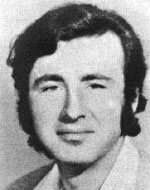Weiss, Traian
Son of Solomon was born on July 14, 1950 in Bucharest, Romania, immigrated with his mother in 1965. Traian studied at the elementary school in his hometown and completed three years of schooling After immigrating to Israel, he was forced to stop his studies because of difficulties in absorption and settled in Dimona, where his mother began working at the Kitan factory and was a member of the Scouts youth movement in Romania, In the fields of swimming and carp.Trian liked handicrafts and participated in arts and painting classes in his youth, he loved classical literature, read books and plays, and even participated in drama at his school. In the early years of his immigration to Israel, Traian worked in various places to assist his mother in the household agriculture, and was drafted into the IDF in August 1968 and assigned to the supply force. After basic training, he was sent to a fuel base in the south of Israel and took various professional courses. The commander of the unit says: “Traian was a soldier dedicated to his job and performed his work impeccably and to the full satisfaction of his commanders.” At the end of his military service he was discharged from the army and went to civilian life in an attempt to integrate into society and establish a family. Their daughter, Sarah, was born two years later, and as a wife, Trian was a devoted, loving and exemplary father, who began working at the Kitan factory in Dimona and was known as a responsible and outstanding worker in 1973. In 1973 he was one of the first to join the Civil Guard in Dimona And was an example for others, and he was loved in society and used to help his friends and encourage them in times of crisis “After the Yom Kippur War, Traian was called up for reserve duty, and after that he decided to volunteer for the career army, and was conscripted into the regular army with the rank of sergeant and served as a storekeeper in the supply base in the south of the country. In the IDF, he feels that his contribution to the state is beneficial and satisfying. On the 17th of Elul 5735 (17.8.1975), Traian fell in the course of his duty in the south of the country, and was brought to rest in the military cemetery in Dimona, leaving behind a wife, two daughters and a mother. In a letter of condolence to the bereaved family, his commander wrote: “When Traian received permanent service there was no limit to his joy and pride in uniform, and he invested his energy and knowledge in advancing the military issues and fulfilling his duties at a higher level than usual. , Knowing that this involves giving up comfort and a normal family life. “
